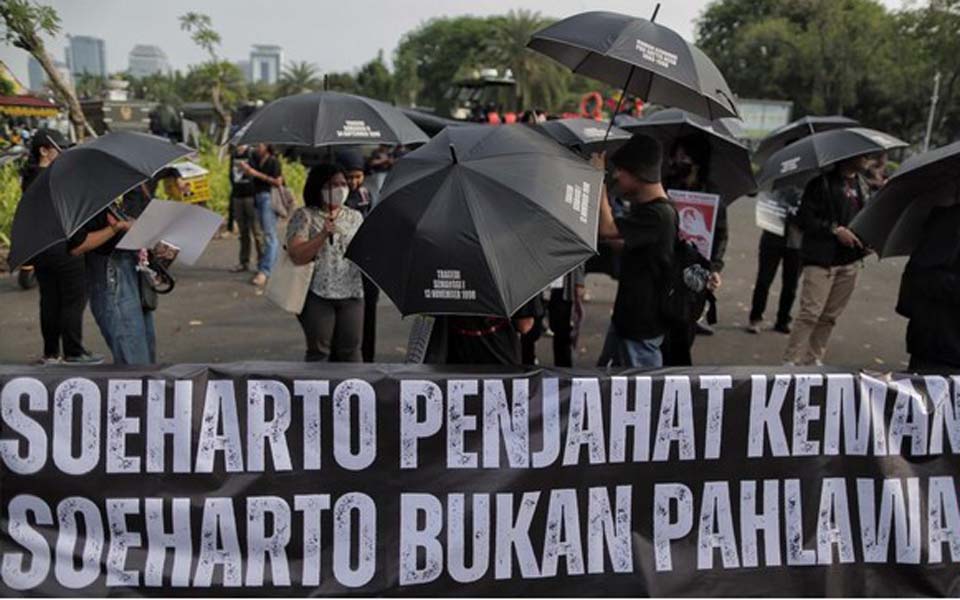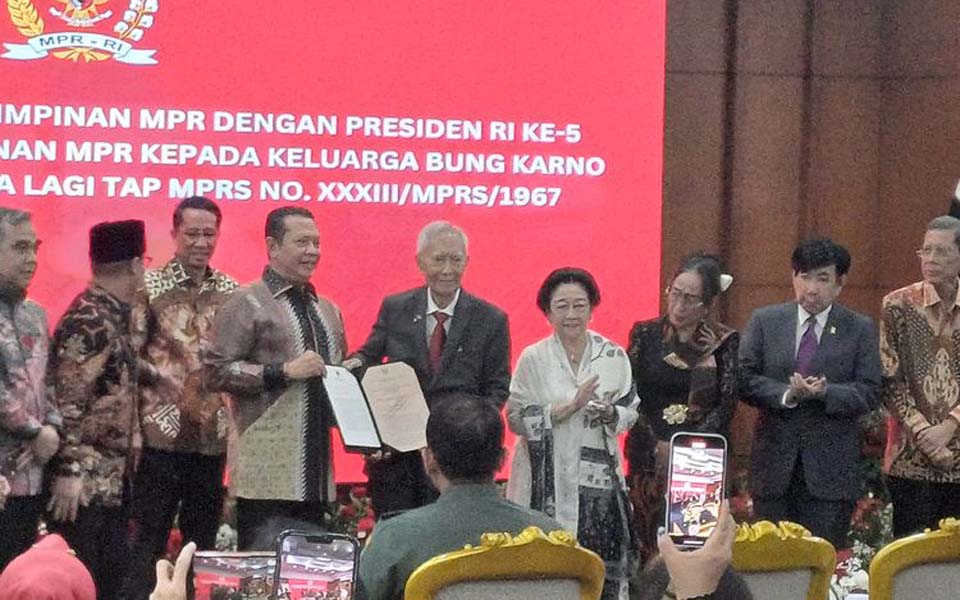Dandhy Dwi Laksono – As in the case of the song Genjer-Genjer which was composed by M. Arief, the song Garuda Pancasila was also written by an artist from the People’s Cultural Institute (Lekra). His name was Sudharnoto.
Because the military and Suharto’s New Order regime deemed Lekra as being the same as the Indonesian Communist Party (PKI), Sudharnoto, who once worked at Radio Republic Indonesia (RRI) in Jakarta was later hunted down and jailed. After being released from prison in 1968-1969 he worked as an ice street vendor and a taxi driver. He was indeed a little more fortunate than M. Arief who disappeared following the September 30, 1965 affair.
In the eyes of the New Order, Arief’s crime was absolutely fatal: composing Genjer-Genjer in 1942, which was written in the context of the people’s suffering following the Japanese invasion and then having the song promoted by PKI deputy Lukman Njoto who was visiting Banyuwangi. But what then was the relationship with Arief as the composer of a song? There was none. A characteristic of fascists is that they don’t need a sensible reason for anything.
In September, the Jakarta Legal Aid Foundation (LBH) and the Indonesian Legal Aid Institute (YLBHI), which have historically defended all groups and ideologies (including hard-line Islamic groups), was slandered as a “nest of PKI” and attacked by an anti-communist mob.
The Farmers Monument (Tugu Tani) in Central Jakarta, a symbol of mass mobilisation to retake West Papua from the Dutch, has also been cited as a PKI symbol.
Karl Marx’s book Capital which contains the basic ideas of communism has even been accused of “teaching the younger generation to become capitalists”.
Just because they both have beards, a picture of Mikhail Bakunin printed on a red T-shirt and worn by one of the participants at the LBH seminar was assumed to be that of Karl Marx and seen as proof that communists were present at the seminar. Yet Bakunin was an opponent of (state) communism in the Soviet Union which he saw as being just as oppressive as capitalism.
Fascist groups who wrap their identity in religion garb even insist on calling President Joko “Jokowi” Widodo a communist even though his policies and development projects are in fact very pro-capitalist and have created conflicts with ordinary people all over the country: the Jakarta Bay reclamation project, the 1 million hectare rice plantation project in Papua which will be managed by private companies (not the people) or the coal fired power plants (PLTU) and dams which do not reflect ecological justice.
These groups don’t want to know and don’t care.
They continue to claim that Jokowi and the Palace support the revival of the PKI. Yet Widodo is not appropriating land and redistributing it to the peasants like the PKI or its affiliated Indonesian Peasants Front (BTI). He’s just handing out land certificates which clearly strengthen private ownership of land. This is far removed from idea of land as a source of production that should be controlled communally.
And through this certification process, privately owned land can more easily be purchased and controlled by capital, as in the case of the Sunda Wiwitan community in Kuningan, West Java. This is quite different from the land at Baduy Dalam or Tenganan Pegringsingan in Karangasem which cannot be bought or sold to resort or hotel developers because it belongs to the traditional community.
But Widodo continues to be called PKI. The same goes for his political party the Indonesian Democratic Party of Struggle (PDI-P), which historically is a fusion of nationalist parties like Sukarno’s Indonesian Nationalist Party (PNI) and non-Islamic religious parties.
Although historically there was an intense conflict between the PNI and the PKI (as reflected in frequent and sharp polemics in the newspapers Suluh Indonesia owned by the PNI and the People’s Daily owned by the PKI), these ahistorical groups do not of course care about this.
The PDI-P is accused as being the same as the communists. Yet its claims to be Marhaenist are a best half-hearted. Leading figures such as Ganjar Pranowo in Central java are more concerned with defending cement factories than farmers like ‘Pak Marhaen’ who are defending their water sources for the irrigation of their small plots of rice paddy.
The PDI-P even supported former Jakarta governor Basuki “Ahok” Tjahaja Purnama whose development policies resulted in mass evictions of the poor, even employing the military for this. Ahok himself is a government official who was quick to refer to residents of the Waduk Pluit reservoir area as “communists” because they were occupying “state land”.
For groups such as those that took part in the anti-communist rally in Jakarta called the “299 Action”, none of this is important or relevant.
They’re in bed with the generals and retired TNI (Indonesian military) officers who yearn for the great days of the New Order regime and the dual military and political function of ABRI (as the TNI was then called).
Officers who could carry a baton but also sit in government as officials in charge of national and regional budgets. Who could mobilise troops but also sit in the House of Representatives (DPR) and take part in drafting laws. Who could wear a beret and military uniform but also sit as commissioners on state-owned and private companies.
Who wouldn’t miss those days? And the cheapest and easiest way to recreate this is by garnering anti-communist sentiment wrapped in religious garb. So, everyone has to be labeled PKI. And in time, everyone will be PKI.
Yet it is they who are really the PKI: Penduduk Kurang Informasi (The Poorly Informed Populace).
Notes
1. The Javanese folk song Genjer-Genjer, which tells the story of the genjer (lettuce) plant that gained popularity during times of extreme poverty due to its abundance amid high food prices, is associated with the PKI affiliated women’s organisation Gerwani or Women’s Movement which was banned and then demonised by the Suharto’s New Order dictatorship following the 1965 anti-communist purge.
2. The People’s Cultural Instituted (Lekra), whose members included celebrated revolutionary author Pramoedya Ananta Toer, was an association of left-wing writers, artists and literary critics affiliated with the PKI that was banned by the Suharto dictatorship following the 1965 anti-communist purge.
3. The term Marhaenism (Marhaenisme) was coined by Sukarno, the founding president of Indonesia. It was derived from the name of a poor farmer, Marhaen, who Sukarno is reputed to have met in the Priangan highlands near Bogor, West Java – a “wong cilik” or “little person” who owned their own means of production but did not become an evil capitalist (ie petty bourgeois).
[Translated by James Balowski. The original title of the article was Semua Akan PKI pada Waktunya.]
Source: https://mojok.co/dandhy-dwi-laksono/esai/semua-pki/.















